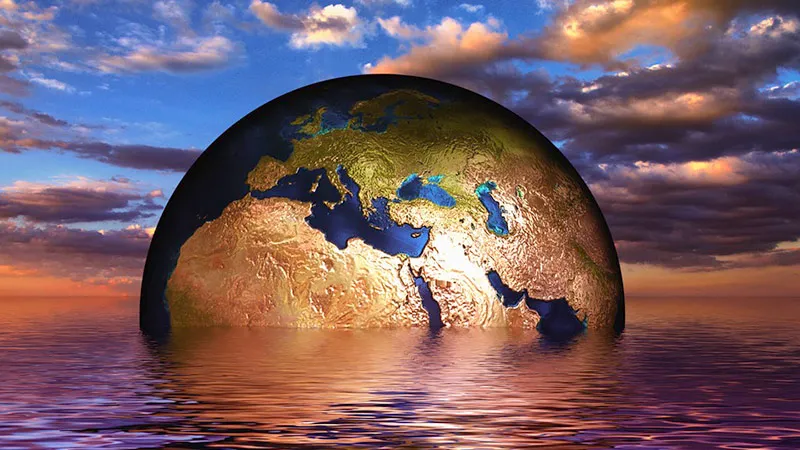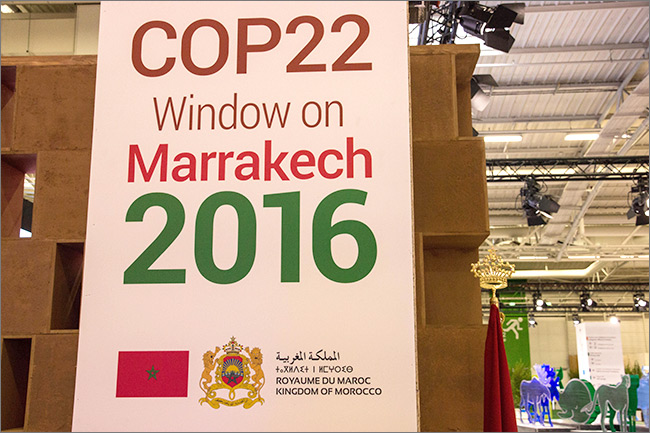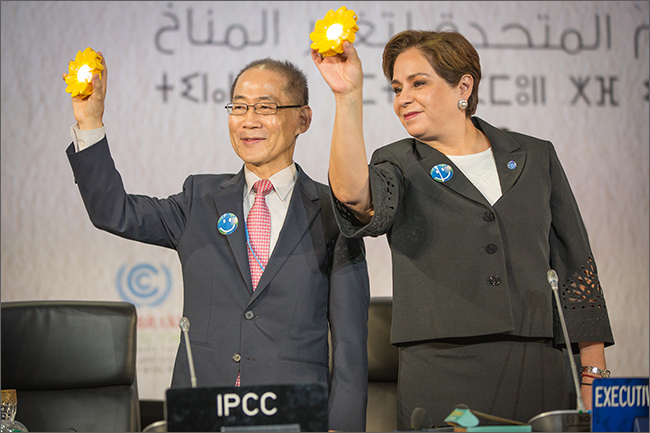-
CENTRES
Progammes & Centres
Location
To those gathered in Marrakech to respond to what is inarguably one of the most important political and economic challenges of our times—climate change

As the UN climate conference got underway on 7 November, fate and the US electorate delivered a body blow to the ambitions of many gathered in Marrakech to respond to what is inarguably one of the most important political and economic challenges of our times—climate change. Voters in the US exhibited their disdain for a globalisation that was perceived to have favoured only a few. They rejected the internationalist proposition of the Hillary Clinton campaign. They vented their frustration at the notion of global governance that took away the rights of communities to decide their own future by placing political agency within a complex architecture that was distant and cold.
(Read India's perspective here)
And they rejected the solutions offered by liberal elites on various issues, including trade, employment, growth and sustainability, by casting their votes in favour of Donald Trump. In the end, he had the more appealing manifesto, rejecting facets of US policies that had sustained over two decades of unfettered globalisation.
Marrakech’s outcome was sealed on 8 November. It was only the evangelical obstinacy of those present that allowed the forum to continue to plod along a path that arguably had been rejected by world’s most influential and oldest democracy.
Perceptions and assessments of climate-change action, climate governance and response to global warming mirrored a growing secular view on the negative experiences of globalisation itself.
These experiences can be clubbed in three broad sets of issues.
First, global action diluted democratic agency as a result of the processes of global governance. These processes had allowed themselves to be captured by a small group of ideologues ning the globe and proliferating different sectors. Their world view inhabited a narrow spectrum of thought with no room for dissent and only contempt for those who did not conform. Global governance worked for those who could reach the forums where debates unfolded. Contrarians, even if they did reach the gates of such forums, found their ability to weigh in and be heard meeting insurmountable barriers.
The second grievance stemmed from a sense of injustice, where at least the popular perception was that globalisation favoured a select elite. Rules were made to perpetuate the hegemony of some and while all may have benefitted from it a little, transformational change continued to be available to only a few. Globalisation and its agents and institutions lacked legitimacy, and they did not even care to rectify this impression.
The third issue was the inherent hypocrisy in the communications and intent of those defending and promoting the ideal of one planet and one humanity. Rich countries, communities and individuals had done little to demonstrate their intention to share their prosperity with those left behind. Their manipulative attempts to evade tax, dilute their commitment to global development aid, and profit under the garb of “innovation rewards” of what were described as “global challenges” and “public bads” had diminished an internationalism that sought to create trade, economic and social interconnectedness.
 COP22 in Marrakech, Morocco, 2016 | Source: Climate Change Org
COP22 in Marrakech, Morocco, 2016 | Source: Climate Change OrgFor many who had spent a better part of the decade achieving the gains (modest) that were signed into an agreement in Paris, the 2016 US election appeared as a mandate against climate action. Rejection of Barack Obama and Clinton-style globalism does implicate the future of climate action as a collective. But exactly how?
Climate debates suffered from all the failings of “Project Globalisation”. They were designed in a manner that any climate action would benefit the few winners and burden the many. Some new winners would be admitted if they signed up to the “new deal”. Climate action reeked of hypocrisy, with rich countries unable and unwilling to commit any significant amounts to support the “loss and damage” and adaptation challenges of the poor. Even on mitigation, the global commitment of a $100 billion remains implausible.
Finally, national actions are defined through a club of woolly eyed “multilateral elites”—all belonging to a Hegelian land. And all reaching the same policy prescriptions irrespective of context, capacity, capability and reality. In the age of hypermedia and an intensely participative public sphere, climate politics appeared distant, cold and undemocratic.
(Read ORF's Road from Paris here)
Marrakech points to three much needed next steps.
 Opening Ceremony of the Marrakech Climate Change Conference | Source: UN Climate Change
Opening Ceremony of the Marrakech Climate Change Conference | Source: UN Climate Change First, nations matter, and any effective climate response will be national and regional. Allow them agency and choice, and do not impose solutions and alien pathways. The “rule book” to monitor national actions should be thrown out lest it be seen as another elite attempt to undermine popular will.
Second, do not allow hypocrisy to destroy the planet. If the rich are concerned for their grandchildren, they must at least guarantee decent living for the current generation of the poor. Put the $100 billion on the table. Then allow your funds and banks to invest in emerging and developing countries and begin to price innovation for the bottom of the pyramid.
Third, climate change as we conceive it, is already upon us and will not suddenly manifest itself in 2020. The rich must underwrite and take responsibility for the devastation that many confront today, and only then will they be able to enlist and seek action from others. Else, climate is a great leveller. We will all boil together, and the poor may have less to leave behind.
This commentary originally appeared in The Mint.
The views expressed above belong to the author(s). ORF research and analyses now available on Telegram! Click here to access our curated content — blogs, longforms and interviews.

Samir Saran is the President of the Observer Research Foundation (ORF), India’s premier think tank, headquartered in New Delhi with affiliates in North America and ...
Read More +